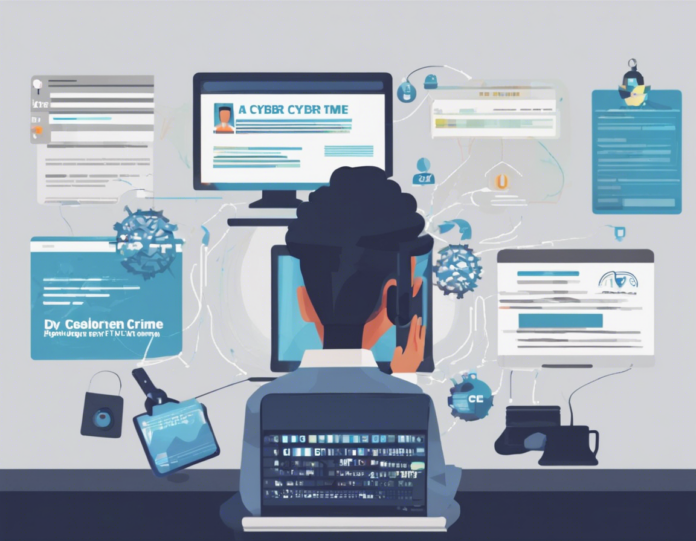Cybercrime is a growing concern in today’s technology-driven world. With the increasing reliance on digital platforms for communication, shopping, banking, and more, the potential for falling victim to cybercrime has also escalated. Being a victim of cybercrime can be a distressing experience, but understanding how to report such incidents can help in mitigating the damage and bringing the perpetrators to justice. In this comprehensive guide, we will discuss the steps to take when reporting cybercrime, including key tips for prevention and resources available to assist victims.
Understanding Cyber Crime
Before delving into the reporting procedures, it is essential to have a clear understanding of what constitutes cybercrime. Cybercrime refers to any criminal act that is carried out through the use of digital technologies, such as computers, the internet, or mobile devices. Common types of cybercrime include identity theft, phishing scams, ransomware attacks, financial fraud, cyberstalking, and online harassment. These crimes often target individuals, businesses, or even governments, with the aim of causing financial harm, stealing sensitive information, or disrupting operations.
Identifying Cyber Crime Incidents
Recognizing when you have become a victim of cybercrime is the first step towards taking action. Here are some common signs that may indicate you have been targeted:
- Unauthorized transactions on your bank account or credit cards.
- Suspicious emails requesting personal information or login credentials.
- Unexplained changes to your credit score or financial accounts.
- Unusual pop-up messages or warnings on your device.
- Difficulty accessing your own accounts due to password changes.
If you notice any of these signs, it is important to act swiftly to minimize the impact of the cybercrime incident.
Steps to Take When Reporting Cyber Crime
-
Document the Incident: As soon as you suspect that you have been a victim of cybercrime, document all relevant information. This includes saving emails, messages, or any evidence of the crime. Take screenshots and notes of any suspicious activities or communications.
-
Report to the Platform or Service Provider: If the cybercrime incident occurred on a specific platform or service, such as social media, online shopping websites, or financial institutions, report the incident to the relevant provider. Most platforms have dedicated channels for reporting fraudulent activities.
-
Contact Law Enforcement: In serious cases of cybercrime, such as identity theft, financial fraud, or online extortion, it is advisable to report the incident to law enforcement authorities. Contact your local police department or cybercrime division to file a formal report.
-
Submit a Complaint to the Internet Crime Complaint Center (IC3): The IC3 is a partnership between the Federal Bureau of Investigation (FBI), the National White Collar Crime Center (NW3C), and the Bureau of Justice Assistance (BJA). You can file a complaint online at the IC3 website, providing details of the cybercrime incident.
-
Notify Credit Bureaus: If you suspect that your identity has been compromised, contact the major credit bureaus (Equifax, Experian, TransUnion) to place a fraud alert on your credit report. This can help prevent further financial damage resulting from identity theft.
-
Seek Legal Advice: Depending on the nature of the cybercrime incident, you may need to seek legal advice to understand your rights and options for pursuing legal action against the perpetrators. Consulting with a cybersecurity lawyer can provide valuable insights into the legal implications of the incident.
-
Monitor Your Accounts: After reporting the cybercrime incident, closely monitor your bank accounts, credit cards, and online activities for any further signs of fraudulent behavior. Regularly check your credit report for any unauthorized transactions or accounts opened in your name.
Tips for Preventing Cyber Crime
While knowing how to report cybercrime is crucial, taking proactive steps to prevent becoming a victim is equally important. Here are some effective tips for preventing cybercrime:
-
Use Strong, Unique Passwords: Create complex passwords for your online accounts and avoid using the same password for multiple services. Consider using a password manager to securely store and manage your passwords.
-
Enable Two-Factor Authentication: Add an extra layer of security to your accounts by enabling two-factor authentication (2FA). This requires a second form of verification, such as a code sent to your phone, in addition to your password.
-
Be Cautious of Phishing Attempts: Exercise caution when clicking on links or downloading attachments from unknown sources. Phishing emails are a common tactic used by cybercriminals to steal sensitive information.
-
Keep Your Software Updated: Regularly update your operating system, antivirus software, and applications to patch any security vulnerabilities. Cybercriminals often exploit outdated software to launch attacks.
-
Secure Your Wi-Fi Network: Use a strong encryption method (WPA2 or WPA3) and change the default login credentials of your Wi-Fi router to prevent unauthorized access to your network.
-
Limit the Information You Share Online: Be mindful of the personal information you share on social media and other online platforms. Avoid posting sensitive details, such as your address, phone number, or financial information.
By incorporating these cybersecurity practices into your daily routine, you can significantly reduce the risk of falling victim to cybercrime.
Resources for Reporting Cyber Crime
In addition to following the steps outlined above, there are several resources available to assist individuals in reporting cybercrime incidents and seeking further support:
-
Cybercrime Support Network: This nonprofit organization offers resources and assistance to victims of cybercrime, including information on reporting incidents and recovering from cyberattacks.
-
Federal Trade Commission (FTC): The FTC provides guidance on reporting identity theft, online scams, and other cyber-related crimes. You can file a complaint with the FTC and access tools for recovering from identity theft.
-
National Cyber Security Alliance (NCSA): The NCSA offers resources, tips, and best practices for staying safe and secure online. They also provide guidance on reporting cyber incidents and raising awareness about cybersecurity.
-
Local Law Enforcement Agencies: Contact your local police department or cybercrime unit to report incidents of cybercrime that impact you or your community. They can provide guidance on filing a report and pursuing legal action.
-
Cybersecurity Companies and Experts: Consult with cybersecurity companies, experts, or consultants for advice on preventing cybercrime, securing your digital assets, and responding to security incidents.
By utilizing these resources and seeking support from relevant organizations, individuals can navigate the reporting process more effectively and receive the necessary assistance to address cybercrime incidents.
Frequently Asked Questions (FAQs) About Reporting Cyber Crime
-
What should I do if I have fallen victim to a ransomware attack?
If your device has been infected with ransomware, disconnect it from the network immediately to prevent the malware from spreading. Report the incident to law enforcement and seek assistance from cybersecurity professionals for mitigating the attack. -
Is it necessary to report phishing emails even if I did not fall for the scam?
Yes, it is advisable to report phishing emails to the relevant authorities, such as the Anti-Phishing Working Group (APWG) or the FTC, even if you did not respond to the email. This helps in tracking and preventing similar attacks in the future. -
Can I report cyberbullying incidents to law enforcement?
Cyberbullying is a serious offense that can have legal implications. If you are a victim of cyberbullying, particularly if it involves threats, harassment, or explicit content, report the incident to law enforcement and seek support from organizations that specialize in online safety. -
What information should I include when reporting a cybercrime incident to law enforcement?
When reporting a cybercrime incident to law enforcement, provide as much detail as possible, including the nature of the crime, the date and time it occurred, any relevant digital evidence, and any information about the perpetrator if known. -
How long does it typically take for law enforcement to investigate a reported cybercrime incident?
The timeframe for investigating a cybercrime incident can vary depending on the complexity of the case, the resources available to law enforcement, and the collaboration with other agencies. It is important to cooperate with authorities and provide any requested information to facilitate the investigation. -
Can I report a cybercrime incident anonymously?
Some reporting platforms and organizations allow individuals to submit cybercrime complaints anonymously to protect their privacy. However, providing identifying information can help in tracking and resolving the incident more effectively. -
What should I do if I suspect that my personal information has been compromised in a data breach?
If you suspect that your personal information has been compromised in a data breach, notify the affected service provider, monitor your accounts for any suspicious activity, and consider placing a freeze on your credit report to prevent unauthorized access. -
Are there international organizations that can assist with reporting cybercrime incidents across borders?
Yes, organizations such as INTERPOL and the European Cybercrime Centre (EC3) provide international collaboration and support for reporting cybercrime incidents that involve multiple jurisdictions. They work with law enforcement agencies worldwide to combat cyber threats and facilitate cross-border investigations. -
What should I do if I receive a suspicious message requesting payment or personal information?
If you receive a suspicious message requesting payment or personal information, do not engage with the sender and do not click on any links or attachments. Report the message to the relevant platform or service provider and consider blocking the sender to prevent further communication. -
How can I stay informed about the latest cyber threats and security updates?
To stay informed about the latest cyber threats and security updates, follow reputable cybersecurity blogs, subscribe to threat intelligence feeds, attend security webinars and conferences, and consult with cybersecurity experts for tailored advice on protecting your digital assets.
In conclusion, knowing how to report cybercrime incidents and implementing effective prevention measures are essential for safeguarding your online security and privacy. By staying informed, proactive, and vigilant, individuals can reduce their risk of falling victim to cyber threats and contribute to a safer digital environment for all.

